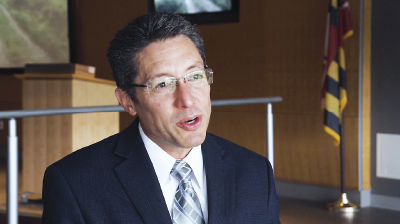New Award Honors Legacy Of Constance Lieber
Abstract
Joseph Gleeson, M.D., is the recipient of the inaugural Constance Lieber Prize for his significant contributions to the understanding of the connection between brain development and behavioral disorders.
This past June, the Lieber Institute for Brain Development presented its inaugural Constance Lieber Prize for Innovation in Developmental Neuroscience to Joseph Gleeson, M.D., a professor of neuroscience at the University of California, San Diego, and the director of neurodevelopmental genetics at UCSD’s Rady Institute for Genomic Medicine.

Joseph Gleeson, M.D., has uncovered numerous inherited and de novo gene mutations that contribute to autism and other neurodevelopmental disorders.
Gleeson has dedicated his career to identifying the genetic mutations that underlie rare, inherited forms of autism and other neurobehavioral disorders. His findings may help pave the way for treatments for these pediatric brain disorders while also revealing important clues about human behavior.
“Dr. Gleeson is a pioneer in the field of translational neuroscience whose landmark studies of Middle Eastern families have provided important links between brain development and behavioral disorders,” said Daniel Weinberger, M.D., director and CEO of the Lieber Institute, at the presentation. The presentation took place at a symposium at Johns Hopkins School of Medicine.
“He is a fitting first recipient of this new award initiated to honor a tremendous woman and her keen insight that mental disorders likely arise during early development.”
As noted by Weinberger, Gleeson has taken advantage of the high degree of interfamilial marriage in many Middle Eastern countries to establish a large cohort of families that express these rare, recessive abnormalities. Through genetic analysis of these families, he has discovered mutations in more than 50 genes that underlie these disorders.
Gleeson cited his 2012 work that linked a form of autism presenting with epilepsy with a mutation in the branched chain ketoacid dehydrogenase kinase (BCKDK) gene as one success story. People with defective BCKDK have very low levels of branched chain amino acids, which are key building blocks of neurotransmitters. Trials in mice, and at least some anecdotal evidence in affected children, suggest that using protein shakes to supplement these amino acids in the diet can ameliorate many of the symptoms.
Not every mutation uncovered involves a straightforward metabolic process that can be fixed with a supplement. But even in cases in which simple interventions may not be possible, finding these genetic markers can help with screening to prevent new cases of these rare diseases. As an example of effective screening, Gleeson pointed out that there hasn’t been a child in the Ashkenazi population born with Tay Sachs disease in over 10 years.
Fully inherited forms of autism are quite rare, but Gleeson thinks genetic screens might also be used for a more common cause of autism: de novo mutations. These are mutations that are not present in the parents but arise during fertilization and fetal development.
A major contributor to potential de novo mutations is sperm DNA, as unlike eggs, sperm proliferate throughout the male’s lifetime, and mutations can accumulate in sperm as men age. Numerous studies have shown that paternal age at conception is a significant risk factor for autism.
Gleeson discussed some of his newer work assessing gonadal mosaicism, which involves sequencing sperm DNA to identify the percentage of sperm cells that contain mutations or variants. The results of these tests can be used to develop an autism “risk score” that can help parents with family planning.
“Studying the early brain is challenging since this organ is encased by a thick skull and develops mostly inside a womb,” Gleeson said, “but we are making steady progress in our field.”
Echoing words spoken by Stephen Lieber during a tribute to his late wife earlier during the day-long award symposium, Gleeson concluded by saying, “I respect [Constance’s] determination to always remain hopeful even at times when hope should be abandoned by rational people. That’s something every researcher should strive for.”
Set to be awarded every two years, the Constance Lieber Prize bestows $100,000 to an investigator (55 or younger) who has made transformative contributions to unlocking the role of brain development in behavioral disorders.
The new prize is a tribute to Constance Lieber and her tireless efforts in supporting, inspiring, and advocating on behalf of mental health research.
These efforts include co-founding the Lieber Institute in partnership with her husband and Milton and Tamar Maltz, as well as providing generous support and long-time leadership as president and president emeritus of the Brain and Behavior Research Foundation (BBRF; formerly NARSAD), the world’s largest private funder of mental health research grants.
Said Herbert Pardes, M.D., president of the BBRF Scientific Council, “Having the prize for Innovation in Developmental Neuroscience named for Constance Lieber, a pioneer in advocacy for brain research and the psychiatrically ill given to Dr. Joseph Gleeson, a pioneer in neuroscience, is a marvelous pairing of one great to another.” Pardes is also a former APA president and former director of the National Institute of Mental Health. ■
More information on the Constance Lieber Prize can be accessed here.



